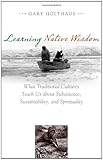Learning native wisdom: what traditional cultures teach us about subsistence, sustainability, and spirituality [Libro electrónico] / Gary Holthaus
Por: Holthaus, Gary [autor/a].
Tipo de material: Libro
en línea Series Editor: Lexington, Ky.: University Press of Kentucky, c2008Descripción: viii, 266 páginas ; 24 centímetros.ISBN: 0813124875; 9780813124872; 9780813141084; 9780813141480.Tema(s): Environmental ethics | Sustainable living | Indians of North AmericaNota de acceso: Disponible para usuarios de ECOSUR con su clave de acceso Nota de bibliografía: Incluye bibliografía e índice: páginas 246-251 Número de sistema: 54779Contenidos:Mostrar
Resumen:
Libro
en línea Series Editor: Lexington, Ky.: University Press of Kentucky, c2008Descripción: viii, 266 páginas ; 24 centímetros.ISBN: 0813124875; 9780813124872; 9780813141084; 9780813141480.Tema(s): Environmental ethics | Sustainable living | Indians of North AmericaNota de acceso: Disponible para usuarios de ECOSUR con su clave de acceso Nota de bibliografía: Incluye bibliografía e índice: páginas 246-251 Número de sistema: 54779Contenidos:Mostrar
Resumen:| Tipo de ítem | Biblioteca actual | Colección | Signatura | Estado | Fecha de vencimiento | Código de barras |
|---|---|---|---|---|---|---|
| Libros | Biblioteca Electrónica Recursos en línea (RE) | Acervo General | Recurso digital | ECO400547794729 |
Incluye bibliografía e índice: páginas 246-251
Axe handles.. Gary Snyder.. Introduction: Why subsistence, sustainability, and spirituality?.. Back To Basics.. Music and story.. Habitat for a sustainable culture.. Functional cultures and structural cultures.. Subsistence.. Exploring subsistence.. Education for subsistence.. Sustainability.. Education for sustainability.. Imagining sustainability.. Defining sustainability.. Stories for sustainability.. Spirituality.. Power and pragmatism of language.. Rectifying the names.. Spirituality for our time.. Conclusion: Creating a sustainable culture.. For those who love nature: A benediction antiphon.. Acknowledgments.. Notes.. Bibliography.. Index
Disponible para usuarios de ECOSUR con su clave de acceso
Scientific evidence has made it abundantly clear that the world's population can no longer continue its present rate of consuming and despoiling the planet's limited natural resources. Scholars, activists, politicians, and citizens worldwide are promoting the idea of sustainability, or systems and practices of living that allow a community to maintain itself indefinitely. Despite increased interest in sustainability, its popularity alone is insufficient to shift our culture and society toward more stable practices. Gary Holthaus argues that sustainability is achievable but is less a set of practices than the result of a healthy worldview. Learning Native Wisdom: Reflections on Subsistence, Sustainability, and Spirituality examines several facets of societies -- cultural, economic, agricultural, and political -- seeking insights into the ability of some societies to remain vibrant for thousands of years, even in extremely adverse conditions and climates. Holthaus looks to Eskimo and other Native American peoples of Alaska for the practical wisdom behind this way of living. Learning Native Wisdom explains why achieving a sustainable culture is more important than any other challenge we face today. Although there are many measures of a society's progress, Holthaus warns that only a shift away from our current culture of short-term abundance, founded on a belief in infinite economic growth, will represent true advancement. In societies that value the longevity of people, culture, and the environment, subsistence and spirituality soon become closely allied with sustainability.Holthaus highlights the importance of language as a reflection of shared cultural values, and he shows how our understanding of the very word subsistence illustrates his argument. In a culture of abundance, the term implies deprivation and insecurity. However, as Holthaus reminds us, "All cultures are subsistence cultures." eng
Our post-Enlightenment consumer-based societies obscure or even deny our absolute dependence on soil, air, sunlight, and water for survival. This book identifies spirituality as a key component of meaningful cultural change, a concept that Holthaus defines as the recognition of the invisible connections between people, their neighbors, and their surroundings. For generations, native cultures celebrated and revered these connections, fostering a respect for past, present, and future generations and for the earth itself.Ultimately, Holthaus illustrates how spirituality and the concept of subsistence can act as powerful guiding forces on the path to global sustainability. He examines the perceptions of cultures far more successful at long-term survival than our own and describes how we might use their wisdom to overcome the sustainability crisis currently facing humanity. eng
Disponible en línea
Disponible en formato PDF
Subscripción a ELSEVIER 26 de diciembre del 2013
